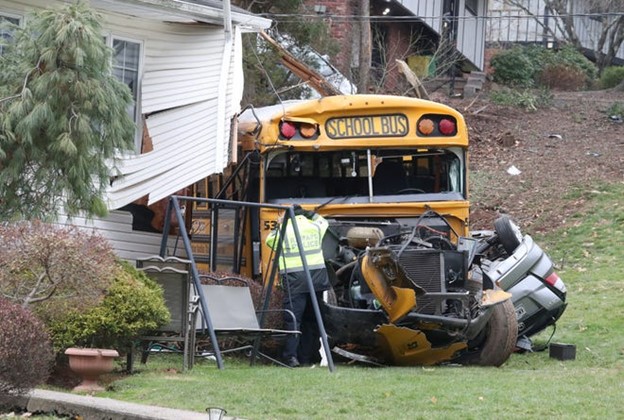Foil: Your right to Know.
“In all our interviews, it is clear that there is a disconnect between the District and Private Contractors,” the audit states. (The Journal News, October 28, 2024)
“A recent state-ordered audit of East Ramapo’s transportation system turned up myriad safety and fiscal concerns among private bus contractors for yeshivas and a dearth of bus inspections on the road by the district. While auditors said many problems were unintentional, the audit outlined possible malfeasance, or intentional fraud.
“We cannot say with any confidence that the district knows who rides what bus and at which time,” the report states. The state Education Department ordered the audit after three tragedies in as many months. From January through March 2024, three children were hit by school buses within East Ramapo’s boundaries; two were killed.
Education Department officials declined to comment on any investigations that could result from the audit’s findings.
“There is a substantial amount of work that needs to be done,” NYSED Deputy Commissioner Jason Harmon said in a recent interview. “This report puts not just a period but an exclamation point on the need.”
The audit found that the district has about 40 bus contractors that are classified in two ways: fleet contractors, which are contracted per hour with routes provided by the district; and Yeshiva Private Contractors, which are awarded per-pupil contracts by the districts and design their own routes.
Most audit findings focused on the latter group.
“In all our interviews, it is clear that there is a disconnect between the District and the Yeshiva Private Contractors,” the audit states.
The audit, performed by Pupil Transportation Safety Institute, a nonprofit in East Syracuse, took place between June 17-June 21, 2024. The USA Today Network New York obtained the full audit through Freedom of Information Requests filed with the school district.
East Ramapo’s transportation costs and concerns
The district operates the largest and most complex student transportation system in the state outside New York City. Universal busing is offered to the district’s more than 40,000 kids, including about 10,500 public-school kids and more than 30,000 who attend private schools, mostly yeshivas that serve a growing Hasidic and Orthodox Jewish population.
While most New York school districts spend about 5% of their budget on transportation, East Ramapo’s busing costs could soon eat up a quarter of its expenditures.
Meanwhile, the district faces continued deficits and restrictions on academic and extra-curricular offerings. This year, state Education Commissioner Betty Rosa issued an unusual interim directive that ordered the school board to increase the property tax levy by 4.38% to further fund the public schools.
Cost has not always equaled consistency or quality. Parents in both the private- and public-school communities have long complained about busing problems, especially in the beginning of school years.
Interim Superintendent Anthony DiCarlo said the school board continues to review the audit’s findings.
Ramping up the transportation department would take place in the 2025-26 budget planning process, DiCarlo said. “The safety of our students is always paramount,” he said.
In January 2024, an 8-year-old was struck and killed by a school bus while walking in New Square. In February, a 5-year-old was killed by her school bus in Spring Valley. In March, a 6-year-old child was injured by a school bus.
In 2023, 21 children were injured after a school bus in New Hempstead skidded off the road and hit a house; the driver faced myriad charges, including felony reckless endangerment.

Who is riding and driving buses?
The audit said it was “evident” the district lacked oversight of yeshiva bus contractors. Auditors said it appeared that most contractors did not obtain superintendent approval for their drivers. Contractors reported such approvals hadn’t happened in several years.
Because the yeshivas handle operations “in-house,” the audit said, the district doesn’t know their bus routes.
“The only time the district would know of a change is when they ask for a copy of the route, which rarely happens,” the audit stated.
The audit recommended that the district require access to “GPS bus information in real time” and continuously update student rider lists.
The district writes thorough contracts, but doesn’t enforce them, according to the audit.
“That’s something that we have to change,” Assistant Superintendent of Business Eric Stark said during a summary of the report at an Oct. 8 school board meeting. Stark’s duties, for now, include overseeing the district’s transportation department. The last transportation director was terminated in January 2024.
The district’s lack of oversight is likely costing it money.
“The contractor provides a monthly listing of students they are invoicing the district for,” the audit states, “however there is no verification required to see if those students are riding the bus or even if they still live within the district.”
The audit found that yeshiva bus providers often rely on “the expectation that the driver knows the children,” which can be an issue when spare drivers are used and there are inconsistent dismissals, including on Fridays when many yeshivas release students early ahead of the Sabbath.
Questions about driver training
Not all bus contractors serving yeshivas cooperated with the audit. Even among those that did, the auditors reported issues with their understanding of the rules and responsibilities for training drivers.
Some findings pointed to potential fraud, the audit found, including documents saying that contractors provided required trainings for drivers. More often, the audit said, bus providers just don’t know the requirements.
The audit said drivers reported they had not been given a mandatory physical performance test; others recalled the test in ways that auditors said indicated did not meet state requirements. Yet, according to the audit, forms in drivers’ files stated that training and testing had been completed.
Ramapo:Third school bus crash reported this year
For some transportation providers, driver training records were inconsistent or incomplete. This aligns with district records, obtained in July 2024 by The Journal News/lohud through FOIL, that lacked data for many bus contractors.
There also seemed to be a lack of understanding among trainers about certain requirements for bus drivers. Drivers must undergo trainings as mandated reporters, meaning they are required by state law to report possible child abuse or neglect. They must also receive training on the state Dignity for All Students Act, known as DASA, which outlines bullying and discrimination policies and protections.
Next steps for bus safety
“Recruit, hire and retain a qualified Transportation Director,” the audit lists in its recommendations. “This is a critical position for any operation, but in a district of this size and complexity it is a must.” The audit also recommends beefing up the rest of the transportation staff by adding three assistants to the transportation director, including one dedicated to private school transportation, with their own support staff.”
Read the complete Journal News coverage here.





